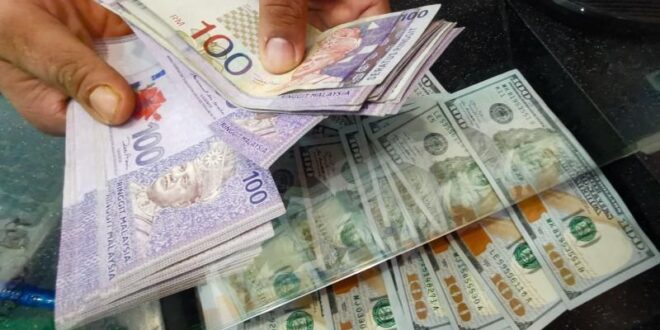PETALING JAYA: Interest rate differentials remain a significant concern for the ringgit, says MARC Ratings.
Malaysia’s lower benchmark interest rate compared to those of advanced economies, especially the United States, has resulted in negative interest rate differentials.
A negative interest rate spread triggers the outflow of financial capital from Malaysia in search of higher returns and this would contribute to an extended depreciation of the ringgit.
MARC Ratings said such depreciation will, in turn, cause spillover effects on the country’s foreign-exchange (forex) reserves.
Currently, Malaysia’s overnight policy rate stands at 3%, while the US federal funds rate stands at a 23-year-high range of 5.25% to 5.5%.
“The median interest rate is 9.25% in the actively traded capital markets of the Americas; 5.25% in Europe, the Middle East and Africa; and 3.5% in the Asia Pacific.
“Of the 32 countries in this sample space, the median interest rate is 5.10%.
“While Malaysia seems to have relatively low interest rates, it is noteworthy that among the 32 countries in the sample space, Malaysia is one of only three countries not expected to cut interest rates over the next 12 months.
“This presents a positive counterweight narrative to Malaysia’s comparatively low interest rates,” according to MARC Ratings.
The rating agency, however, noted that the market’s expectation of stable interest rates in Malaysia, in contrast to rate cuts in most other countries, suggests that its current interest rate is a result of interest rate normalisation.
Unlike in other countries, interest rates in Malaysia have increased only moderately in recent years.
The present monetary policy is described as supportive by Bank Negara, it added.
MARC Ratings further noted that the 10-year Malaysian Government Securities to 10-year US Treasury yield differential declined from a positive 117 basis points (bps) in February 2019 to negative 39 bps in February 2024.
During this time, the ringgit depreciated from RM4.07 to RM4.75.
MARC Ratings stated that Malaysia’s healthy banking system and sound credit quality were sufficient to withstand an increase in the policy rate.
“Contrary to common perception, the increase in the interest rate by 125 bps to 3% in 2023 from 1.75% in 2022 did not result in a rise in loan impairments.
“Throughout this period, the gross impaired loan ratio remained very low and declined from the peak of 1.85% in June 2022 to 1.65% as at January 2024,” it added.
Meanwhile, the rating agency cautioned that low interest rates would depress returns to both domestic and international investors.
This adversely impacts net pension funding positions and retirement savings at the domestic level, while also discouraging international funds from flowing into Malaysia.
While there are multiple factors affecting the level of savings and debt, interest rates present a policy option to influence preferences towards borrowings and savings.
It is noteworthy that Malaysia’s gross savings as a share of gross domestic product (GDP) dropped to 26.6% in 2022 from 32.7% in 2002.
Consequently, the household debt-to-GDP ratio rose to 81% in 2022 from 67.2% in 2002.
Low interest rates may encourage a tendency towards an expansionary fiscal policy and a fiscal deficit, according to MARC Ratings.
This, in turn, will raise money supply, lower the price of money and cause depreciation pressures on a currency.
“Plans have been made in Malaysia to contain and lower the fiscal deficit over time.
“However, the financial market’s (including the ringgit’s) reaction to these measures depends on the management of expectations, including the ability to meet or exceed originally planned targets on GDP growth and the fiscal balance-to-GDP ratio.
“Apart from interest rate differentials influencing the exchange rate, capital flows and non-financial market flows, particularly those stemming from the trade sector, play a major role in influencing the value of the exchange rate over the long term,” said MARC Ratings.
 BeritaKini.biz Berita Viral Terkini di Malaysia
BeritaKini.biz Berita Viral Terkini di Malaysia





